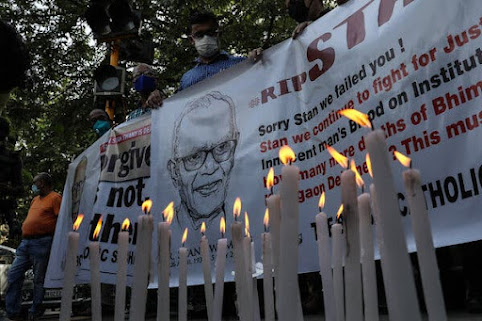Jailing of India dissidents is challenged in courts. Take the starting unfurl of Father Swamy's death which came after his repeated request for bail on medical grounds were denied.
An independent investigation by a digital forensics firm suggested that his computer, which Indian investigators had seized, had been hacked and files had been planted on it.
After Father Swamy's death, Justice Deepak Gupta, a former Supreme Court judge, said that antiterrorism law was being misused, and that courts should draw up clear guidelines.
''Are we human?'' he asked.
The two women walked through the gate of India's notorious Tihar prison, raising their fists and chanting protest slogans.
Their release on bail in June after spending a year in custody was unusual, given the accusations they face : They have been charged with terrorism.
Ph.D student Natasha Narwal and Devangana Kalita, student activists, were imprisoned under an antiterror law with roots in the British colonial era that critics say the Indian government is increasingly using to silence dissent.
Under Prime Minister Narendra Modi, those charged through the anti-terrorism law, called the Unlawful Activities Prevention Act, have typically spent years languishing in jail before their trials have begun.
Thousands of people - including poets, political organizers and a Catholic priest - have been jailed. The law is increasingly being challenged by the courts, which say it is an abuse of power.
The law ''makes you guilty unless and until you are able to prove yourself innocent,'' said Ms. Narwal, a founder of women's student collective Pinjra Tod, or Break the Cage.
''Coming out of jail in one year,'' she added, ''is a miracle''.
Mr. Modi's government has developed a playbook to police dissent and free speech, criminal justice experts have said. Since taking office in 2014, Mr. Modi has increasingly relied on laws that give authorities greater powers to detain people and act against those accused of inciting hatred against the government.
The Modi's government in 2019 gave itself greater access to people's online data. Last year, it proposed a law that would make encrypted messages ''traceable,'' prompting a lawsuit from the messaging service WhatsApp, which said it violated Indians' constitutional right to privacy.
Officials have succeeded in persuading social media giants like Facebook and Twitter to shutdown millions of accounts in India for a wide range of perceived offenses against citizens and the government.
The authorities also routinely turn off internet services during protests, pushing India to the top of a list of global offenders tracked by the watchdog group Access Now.
The antiterror law, which gives judges the right to extend pretrial detention almost indefinitely, has been among Mr. Modi's most repressive tools.
During the prime minister's tenure, the number of cases filed under the antiterror has surged. More than 8.300 people have been arrested and jailed in the last five years, according to official data.
There are no reliable official statistics about the use of the law before 2014, but legal experts say the number of cases was negligible.
The government told Parliament in August that only about 2 percent of cases registered under the law from 2016 to 2019 had resulted in convictions. But even without convictions, people detained under the law can be jailed for years before their cases go on trial.
''It appears that in its anxiety to suppress dissent and in the morbid fear that matters may get out of hand, the state has blurred the line between the constitutionally guaranteed right to protest and terrorist activity,'' the Delhi High Court said in a hearing in June that resulted in the release on bail of Ms. Narwal and two fellow activists.
''If such blurring gain traction,'' the court continued, ''democracy would be in peril.''
The World Students Society thanks authors Emily Schmall and Sameer Yasir.

.png)


0 comments:
Post a Comment
Grace A Comment!